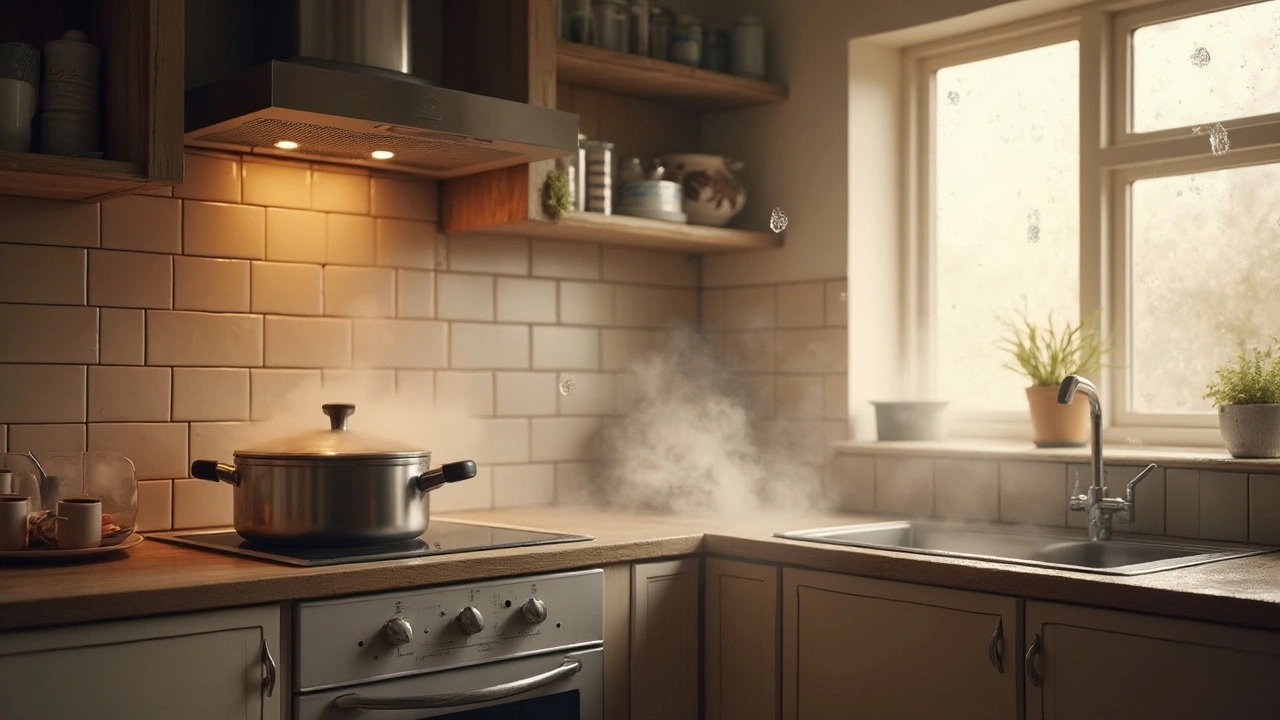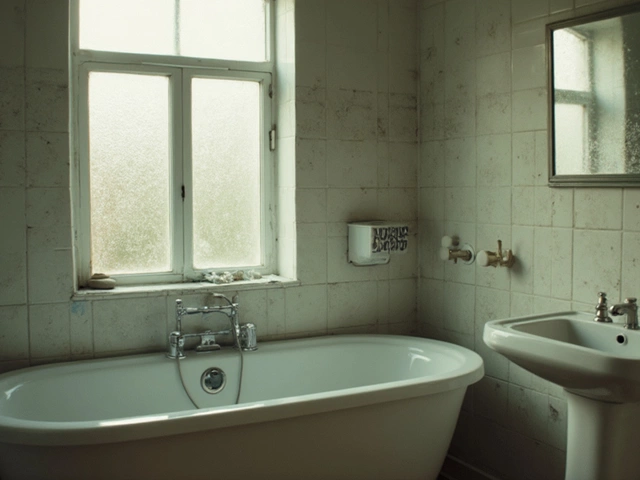Ever walked into a room and wondered why the air felt a bit...off? That's what happens when an extractor fan isn't pulling its weight. These fans are the unsung heroes of our kitchens and bathrooms, whisking away moisture and odors before they become a problem. But what if you decide to skip using them altogether? The results might surprise you.
Without an extractor fan, you'll likely notice an increase in moisture levels. This can lead to mold growth on walls and ceilings, especially in bathrooms. Mold isn't just a visual eyesore; it's a health hazard and a home nightmare that demands heavy cleaning.
Then there's the smell. Cooking up a storm without an extractor means odors linger in your kitchen, and let's be honest, nobody wants yesterday's dinner to haunt their place. Keeping your space smelling fresh requires good ventilation, so unless you want your living room to wear last night's fish fry like a badge of honor, using a fan is a good call.
- Why Extractor Fans Matter
- Moisture and Mold Risks
- Odor Control
- Energy Efficiency Benefits
- Common Problems When Ignored
- Maintenance and Repair Tips
Why Extractor Fans Matter
Extractor fans are more than just a fancy add-on to your home—they're essential for maintaining a healthy and pleasant living environment. Ever wonder why? It all boils down to a few key benefits that these fans offer, each addressing common issues we face in our kitchens and bathrooms.
Controlling Moisture and Preventing Damage
One of the primary roles of an extractor fan is to control moisture levels. In areas like the bathroom, where steamy showers are a daily occurrence, the buildup of moisture can lead to some nasty consequences. We're talking mold, mildew, and even structural damage over time. Without proper ventilation, the excess humidity can warp doors, peel paint, and deteriorate wooden surfaces.
Odor Elimination
Kitchens can be a wonderland of delicious smells, but they can also harbor unwanted odors if not ventilated properly. That's where the extractor fan steps in. It captures cooking fumes and smoke, sending them outside before they settle into your soft furnishings or get absorbed by your walls. It's a simple solution to keep the house smelling fresh, without resorting to endless sprays of air freshener.
Boosting Energy Efficiency
Believe it or not, using an extractor fan can contribute to energy savings. By removing extra moisture, your heating and cooling systems don’t need to work as hard to maintain a comfortable temperature. It's a small change that can accumulate savings over time on your energy bill.
Wondering if your home is missing out? Here's a quick look at how an extractor fan operates:
- A motorized fan spins to create airflow.
- Air is drawn from the room and pushed outside through a duct.
- This process reduces moisture, smoke, and odors, keeping indoor air fresh.
These fans are a straightforward yet crucial investment in your home’s well-being. Ignoring them can lead to more than just a bit of stale air—it can mean costly repairs and health issues down the line. So the next time you feel tempted to skip switching it on, think about all the hard work this little device does to keep your living space in top shape.
Moisture and Mold Risks
You might not think of it while brewing your morning coffee, but your kitchen's humidity can skyrocket without a working extractor fan. That moisture doesn't just disappear; instead, it settles on surfaces, creating a perfect environment for mold. And let me tell you, mold isn't something you want setting up shop in your home.
Hidden in the nooks and crannies, mold thrives in damp areas left unventilated. Once it starts to grow, it can spread quickly, causing structural damage and health issues. Those black spots on the ceiling aren't just ugly; they can trigger allergies or even asthma in sensitive individuals.
Why Moisture Management is Key
You see, managing moisture isn't just about avoiding gross-looking mold. A humid room feels stuffy, and it can affect materials, making paint peel or wood warp. This has a knock-on effect on your home's value, and you really don't want a mold problem showing up in a property survey.
How to Combat Dampness
- Use Your Extractor Fan: An efficient way to draw out moisture, preventing it from seeping into walls and ceilings.
- Keep Air Moving: Regularly open windows or use other fans to keep air circulating.
- Stay Dry: Wipe down wet surfaces, especially after cooking or showering.
A small fix like regularly maintaining your extractor can do wonders. It's like your home's silent bodyguard, quietly keeping your space fresh and mold-free.
Odor Control
We all know the smell of a kitchen in full swing can be either delightful or downright disastrous. Without a extractor fan, those culinary odors don't just disappear. They tend to stick around, embedding themselves in fabrics and cushions, leaving your entire house smelling like yesterday's plate of fried onions. Not exactly the welcome-home scent most folks dream of.
The role of an extractor fan in odor control can't be overstated. By effectively venting out stale and strong odors, these fans keep your home smelling fresh, making it a more pleasant place to spend time. Who doesn't want their space to smell inviting?
How Does It Work?
Extractor fans use powerful motors to draw cooking fumes and odors through filters, which can trap grease and particles, before banishing them outside. Think of it as a magic dustbin for smells. By regularly using the fan, you're helping your home maintain a cleaner air quality, free from lingering aromas.
Here's a useful tip: regular maintenance of your extractor fan, including cleaning or replacing filters, can greatly improve its efficiency in odor control. A clogged filter can't do its job right, and nobody wants a half-working fan when things start to sizzle in the kitchen.
Choosing the Right Fan
When installing or replacing an extractor fan, consider the size of your kitchen or bathroom. A fan that's too small won't be very effective at odor removal. Look for models with a higher extraction rate if you frequently cook strong-smelling dishes. It's a small detail, but it makes a huge difference!

Energy Efficiency Benefits
Now, let's talk about how an extractor fan can save you a bit of cash on your energy bills. Sounds too good to be true? Well, here’s how it works. Proper ventilation helps regulate temperature and remove humidity, which means your heating and cooling systems won't have to work as hard. That's less energy consumption and lower bills for you.
Imagine your home like a big, breathable bubble. Keeping the airflow steady with a fan helps that bubble stay at the right temperature. Especially in places like the kitchen and bathroom where steam is part of the package, your fan’s job is to grab all that extra moisture before it settles in. This reduces the strain on your HVAC system significantly.
You see, high humidity can make a space feel warmer than it is. So, when you reduce moisture with a ventilation system, you often find yourself reaching for the air conditioning less. The bonus? Less wear and tear on your AC unit, which translates to fewer repairs and longer lifespans. It's all interconnected.
There’s also the factor of modern, energy-efficient extractor fans. If you’re thinking about replacing or repairing your fan, look into models that are designed to use minimal electricity. Some new models even come with smart features that adjust the fan’s operation based on the room’s conditions.
So, keeping your extractor fan in good shape isn't just about air quality – it's also a smart move for those bills. Investing a little time in fan maintenance now can make for a surprisingly lighter load later on your wallet.
Common Problems When Ignored
Alright, let's get down to it. Ignoring an extractor fan isn't just about letting odors hang around. We're talking about a list of problems that might creep up if you decide to give this handy device the cold shoulder.
Excessive Moisture Build-Up
This is the big one. When you don't use an extractor fan, moisture from showers and stovetops doesn’t get vented out. Over time, this excessive moisture can cause damp spots to develop, creating a breeding ground for mold and mildew. Not the housemates you want!
Deterioration of Paint and Wallpaper
Ever seen those peeling wall corners or flaky paint spots? High humidity levels precipitate these issues, especially in kitchens and bathrooms. Regularly using a fan helps prevent your home from turning into a scene from a horror flick.
Increased Energy Costs
Ignoring your fan might eventually lead to higher energy bills. How, you ask? When moisture increases, it makes your air conditioning work harder and run longer to keep your home comfortable. Who knew your ventilation choice could impact your wallet that way?
Health Risks
Let's not forget the health angle. High humidity combined with mold can cause or exacerbate respiratory problems like asthma. Proper ventilation can help ensure the air you breathe is free from these nuisances.
Remember, it's not just a job for the fan repair guy down the street to fix. A little regular maintenance and remembering to flick the switch can go a long way. Keep those fans working and you'll avoid a slew of annoying, and sometimes costly, issues down the road.
Maintenance and Repair Tips
Taking care of your extractor fan might not seem like a thrilling weekend project, but it's crucial to keep it running smoothly. Regular checks and a bit of TLC can save you from costly repairs down the road.
Regular Cleaning
A simple but effective way to keep your fan in top shape is by cleaning it regularly. Dust and grease build-up can drastically reduce its performance. Here's a quick checklist:
- Turn off the power to ensure safety.
- Remove and wash the fan cover in warm soapy water.
- Use a soft brush to clean the blades and surrounding areas.
Inspect for Wear and Tear
Even the best fans aren't immortal. Over time, parts can wear out. Check for any unusual noises or decreased efficiency. These are often the early warning signs that something needs fixing. As ventilation expert Andrew Miles often says,
"A stitch in time saves nine. A timely repair can extend the life of your fan significantly."
Professional Maintenance
Consider scheduling an annual check-up with a professional, especially if you're not the DIY type. They can spot issues you might miss and keep your fan working efficiently.
If you're curious about when it's time to replace your fan, a good rule of thumb is to purchase a new one if repairs start costing more than half the price of a new unit.
Quick Troubleshooting Tips
If you're facing issues, try these steps before calling a pro:
- Ensure the power supply is connected properly.
- Check for blown fuses or tripped circuit breakers.
- Make sure the fan's motor isn't obstructed by debris.
| Issue | Possible Solution |
|---|---|
| Noisy Operation | Tighten loose screws or replace worn-out bearings. |
| Weak Airflow | Clean the filters, blades, and ducts to enhance airflow. |
By showing your extractor fan a little love, you keep your space fresh and free of pesky problems. And that's something everyone can breathe easier about.




